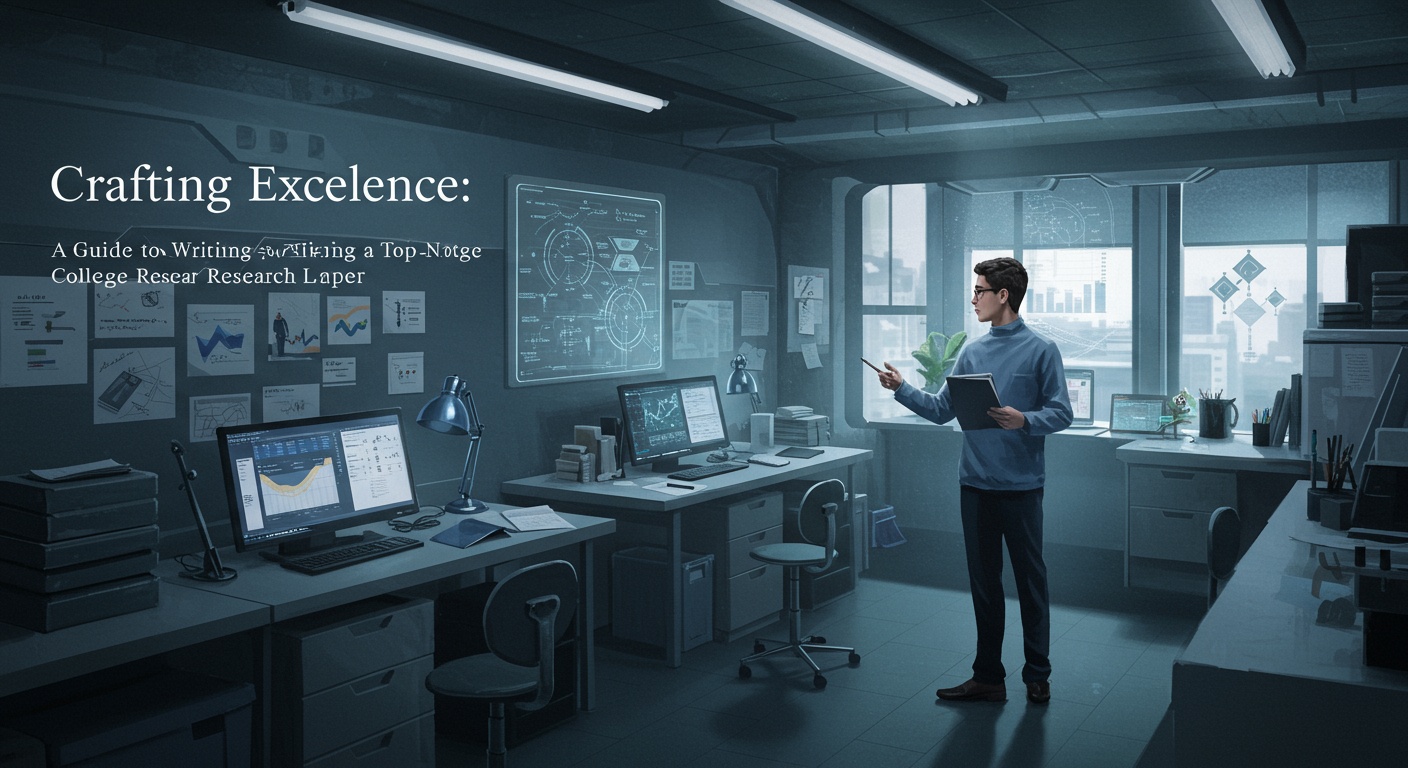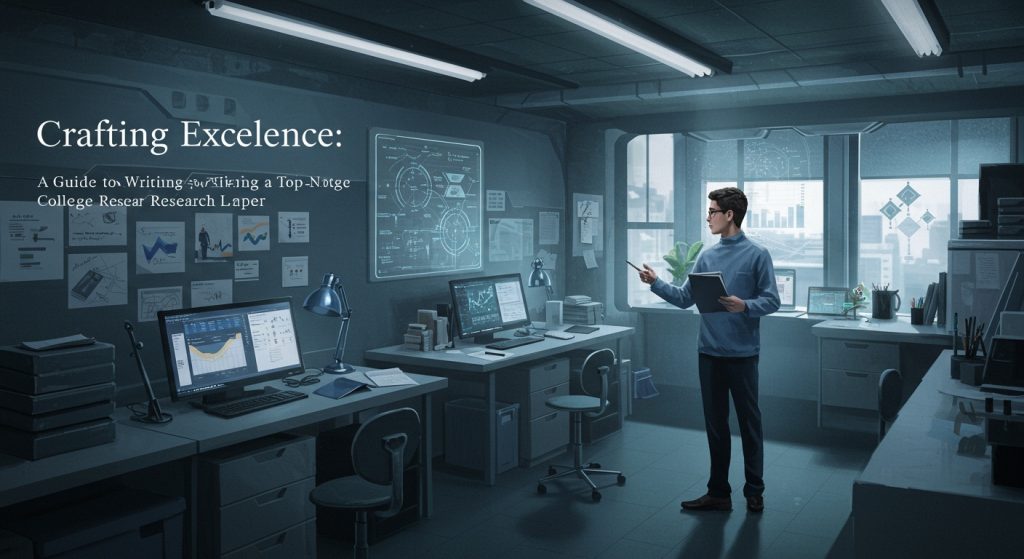Navigate the complexities of academic research with precision. Constructing a powerful college research paper in today’s rapidly evolving academic landscape demands more than just summarizing existing knowledge. It requires synthesizing details, critically evaluating diverse perspectives. Contributing original insights, especially considering the increasing prevalence of AI-assisted research tools. Learn to leverage digital libraries and sophisticated search algorithms effectively, while also understanding the nuances of source evaluation to avoid misinformation, a critical skill in the age of deepfakes and algorithmically curated content. Master the art of crafting compelling arguments supported by robust evidence, ensuring your research not only meets but exceeds expectations, demonstrating intellectual rigor and scholarly acumen.

Understanding the Assignment: The Foundation of Success
Before even thinking about a topic, meticulously dissect your professor’s instructions. This is your roadmap. What is the paper’s purpose? Is it an argumentative essay, a literature review, a case study, or something else entirely? What are the specific requirements regarding length, formatting (MLA, APA, Chicago, etc.). Sources? Are there any explicitly prohibited topics? Ignoring these details is a recipe for disaster, regardless of how brilliant your writing might be. Think of it as building a house: you need a solid blueprint before you can even think about laying the foundation. A well-understood assignment is half the battle won.
- Purpose
- Requirements
- Restrictions
What is the goal of the paper? To persuade, review, inform, or something else?
Length, formatting style (MLA, APA, Chicago), citation guidelines.
Any topics that are off-limits or specific angles to avoid.
Choosing the Right Topic: Igniting Your Intellectual Curiosity
Selecting a compelling topic is crucial. It should be something that genuinely interests you, as this enthusiasm will translate into a more engaging and insightful paper. But, interest alone isn’t enough. The topic also needs to be manageable in scope and supported by sufficient scholarly resources. Avoid overly broad topics that would require a book to cover adequately. Conversely, steer clear of niche topics with limited research available. A good starting point is to brainstorm potential areas of interest, then conduct preliminary research to assess the feasibility of each. Consider topics that allow you to explore different perspectives and engage in critical analysis.
Crafting a Strong Thesis Statement: The North Star of Your Paper
The thesis statement is the backbone of your research paper. It’s a concise declaration of your main argument or point of view. It should be debatable, specific. Provide a clear roadmap for your paper. Think of it as the North Star guiding your readers through the sea of details. A weak thesis is vague and uninspired; a strong thesis is focused and compelling. For example, instead of writing, “Technology has impacted education,” a stronger thesis would be, “The integration of interactive simulations in college-level science courses significantly improves student comprehension and retention of complex concepts compared to traditional lecture-based learning.”
Conducting Thorough Research: Diving Deep into the Scholarly Pool
Research is the heart and soul of any academic paper. It’s not just about finding data; it’s about critically evaluating sources, identifying patterns. Synthesizing different perspectives to support your thesis. Utilize a variety of resources, including academic journals, books, reputable websites. Primary sources (if applicable). Be discerning about the credibility of your sources. Prioritize peer-reviewed articles and publications from established scholars and institutions. Avoid relying solely on Wikipedia or other unreliable sources. Keep meticulous records of your sources to avoid plagiarism and to facilitate proper citation.
Organizing Your Thoughts: Building a Logical Structure
A well-organized research paper is easy to follow and effectively communicates your ideas. Start with an outline that maps out the main points you want to cover and the order in which you will present them. Each paragraph should focus on a single idea and contribute to the overall argument. Use transitions to connect paragraphs and ensure a smooth flow of ideas. A typical research paper structure includes:
- Introduction
- Body Paragraphs
- Counterarguments
- Conclusion
Introduces the topic, provides background data. States the thesis.
Develops the main points of your argument, supported by evidence from your research. Each paragraph should address a specific aspect of your thesis.
Acknowledges and addresses opposing viewpoints. This demonstrates that you have considered different perspectives and strengthens your argument.
Summarizes your main points, restates your thesis in a new way. Offers a final thought or call to action.
Writing with Clarity and Precision: Communicating Effectively
Academic writing should be clear, concise. Precise. Avoid jargon and overly complex sentence structures. Use strong verbs and active voice whenever possible. Proofread carefully for grammar, spelling. Punctuation errors. Pay attention to sentence structure and flow. Ensure that your writing is objective and avoids personal opinions or biases (unless explicitly required by the assignment). Remember, the goal is to communicate your ideas effectively to your audience.
Proper Citation and Avoiding Plagiarism: Maintaining Academic Integrity
Plagiarism is a serious academic offense. It’s crucial to properly cite all sources, even if you are paraphrasing or summarizing someone else’s ideas. Familiarize yourself with the specific citation style required by your professor (MLA, APA, Chicago, etc.) and follow the guidelines meticulously. Use citation management tools like Zotero or Mendeley to organize your sources and generate citations automatically. When in doubt, cite! It’s always better to over-cite than to risk plagiarism.
Revising and Editing: Polishing Your Diamond
Writing is a process of revision and refinement. Once you have completed a draft of your paper, set it aside for a day or two, then return to it with fresh eyes. Read your paper critically, looking for areas that need improvement. Are your arguments well-supported by evidence? Is your writing clear and concise? Are there any grammatical errors or typos? Consider asking a friend or classmate to read your paper and provide feedback. Pay attention to the overall flow and coherence of your paper. Editing is the final polish that transforms a good paper into an excellent one.
Understanding Different Citation Styles: A Brief Overview
Choosing the right citation style is crucial for academic integrity and proper attribution. Here’s a brief overview of some common styles:
| Citation Style | Commonly Used In | Key Features |
|---|---|---|
| MLA (Modern Language Association) | Humanities, literature, languages | Emphasis on author and page number in in-text citations. “Works Cited” page at the end. |
| APA (American Psychological Association) | Social sciences, psychology, education | Emphasis on author and date in in-text citations. “References” page at the end. |
| Chicago/Turabian | History, business, fine arts | Offers two systems: notes and bibliography (used in humanities) and author-date (used in sciences). |
| IEEE (Institute of Electrical and Electronics Engineers) | Engineering, computer science | Uses numbered citations in square brackets. “References” section at the end. |
Real-World Applications: Research Skills Beyond the Classroom
The skills you develop while writing college research papers are invaluable and transferable to many areas of life and career. The ability to conduct thorough research, assess data critically. Communicate effectively are essential for success in various fields, from journalism and law to business and science. Whether you’re writing a grant proposal, preparing a presentation, or simply trying to make an informed decision, the research skills you hone in college will serve you well. Consider a marketing professional researching consumer trends, a lawyer building a case, or a scientist analyzing experimental data – all rely on the foundational skills learned through academic research.
Conclusion
Crafting a top-notch research paper is a journey, not just a destination. You’ve learned the importance of a strong thesis, rigorous research. Clear articulation. Now, take that knowledge and apply it. Remember that time I spent weeks wrestling with a literature review, only to realize my search terms were too narrow? Don’t make the same mistake! Embrace tools like Google Scholar alerts to stay updated on current trends in your field. Beyond the technical skills, cultivate intellectual curiosity. Ask “why” relentlessly. Think of your research paper as a contribution to a larger conversation, a chance to push the boundaries of knowledge. As you refine your work, focus on clarity and precision. A well-written paper is not just informative, it’s persuasive. That persuasion stems from the strength of your argument and how clearly you present it. Go forth and write something remarkable!
More Articles
Navigating The UCAS Application Process: Key Dates and Tips for Success
UK Postgraduate Funding: A Guide to Scholarships and Bursaries for International Students
Choosing The Right UK University Course: A Practical Guide For 2025 Intake
Mastering French: Practical Tips for University Students
FAQs
Okay, so what exactly makes a college research paper ‘top-notch’ anyway? Is it just length?
Definitely not just length! Think of it like this: a top-notch paper is clear, well-researched. Makes a compelling argument. It’s got a strong thesis, solid evidence to back it up. Is written in a way that’s easy (and maybe even enjoyable!) to read. Length matters a little – you need enough space to develop your ideas – but quality trumps quantity every time.
I’m totally blanking on where to even START. Any tips for overcoming that initial ‘I don’t know what to write about’ feeling?
Been there! Brainstorming is key. Try thinking about topics from your course that you found particularly interesting or confusing. Browse relevant journals or books to see what’s being discussed. Even just chatting with your professor can spark an idea. Don’t put pressure on yourself to have the perfect topic immediately; just start exploring!
How much research is ‘enough’ research? I don’t want to get bogged down in sources forever!
Good question! It’s a balancing act. ‘Enough’ means you’ve explored a variety of perspectives and have sufficient evidence to support your claims. Don’t just grab the first few sources you find; dig deeper. Once you start seeing the same arguments and evidence repeated, you’re probably getting close. Also, remember to focus on credible sources – academic journals, reputable books. Established websites.
What’s the deal with citations? They seem so tedious!
Ugh, I hear you! But citations are super essential. They give credit where credit is due, showing you’re not plagiarizing. They allow readers to verify your data. Think of them as signposts, guiding your reader back to your sources. There are different citation styles (MLA, APA, Chicago, etc.) , so make sure you know which one your professor wants and stick to it consistently.
My professor keeps talking about a ‘thesis statement.’ What is that. Why is it so essential?
Your thesis statement is the heart of your paper – it’s the main argument you’re trying to make. It should be clear, concise. Arguable. Think of it as a roadmap for your reader, telling them what to expect and why it matters. A strong thesis makes writing the rest of the paper much easier because you have a clear direction.
Is it okay to ask my professor for help? I don’t want to seem like I’m asking them to write the paper for me.
Absolutely! Professors are there to help you learn. Asking for clarification, feedback on your topic, or guidance on your research is perfectly acceptable (and often encouraged!). Just be sure to come prepared with specific questions and show that you’ve already put in the effort. Avoid asking them to do your work for you. Focus on getting clarity on concepts or directions.
I’ve finished writing… Now what? Besides celebrating, of course!
Definitely celebrate! But before submitting, take the time to revise and edit your work carefully. Proofread for grammar and spelling errors, check your citations. Make sure your arguments are clear and well-supported. It’s also a great idea to have someone else read your paper and provide feedback. A fresh pair of eyes can catch mistakes you might have missed.



